19th Sunday in Ordinary Times
Wisdom 18:6-9; Ps. 32: 1.12.18-20. Heb. 11:1-2.8-19; Gosp. of Luke 12:32-48
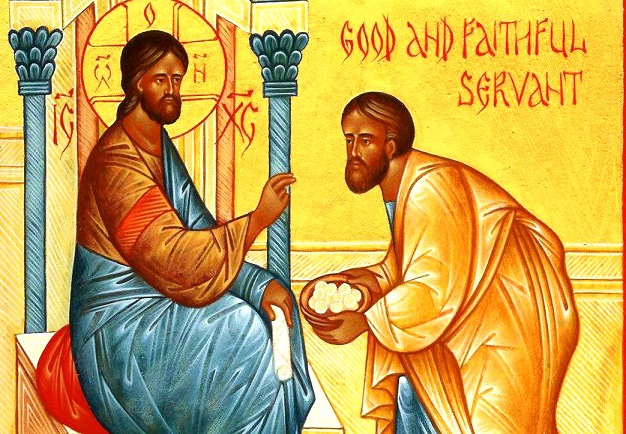
Preached by Msgr Philip Heng, SJ at Cathedral of Good Shepherd, Singapore on 11 August 2019
In today’s Gospel of St Luke that we just heard, Jesus proclaims to His disciples, “There is no need to be afraid, little flock, for it has pleased your Father to give you the Kingdom. Sell your possessions and give alms. Get yourselves purses that do not wear out, treasures that will not fail you, in heaven where not thief can reach it and no moth destroy it. For where your treasure is, there will your heart be also.”
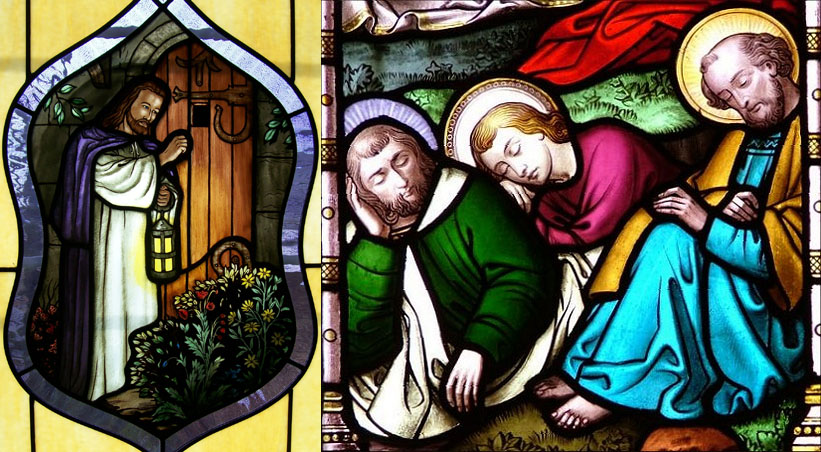
My brothers and sisters in Christ, through three images of servant and Master relationships, Jesus in today’s Gospel is urging you and I to live our faith with detachment and vigilance, and with the clear vision that our ultimate goal in our lives is to gain the “heavenly Kingdom” that God our Father wants to give to you and to me, and indeed to all peoples. I have no doubts that deep in our hearts, all of us and every person in the world wants to gain and receive the gift of eternal life.
However, the sad reality is that even as we see, know and believe in the ultimate and divine blessings that God wants to give us, for many of us, we seem to be used to living a faith that remains lukewarm and uncommitted to this Truth of the Gospel. As such, strangely, many of us distance ourselves from the gift of an eternal happiness with God, and foolishly trade this most precious divine gift for the possessions of the gold, glory and glamour of this passing world.
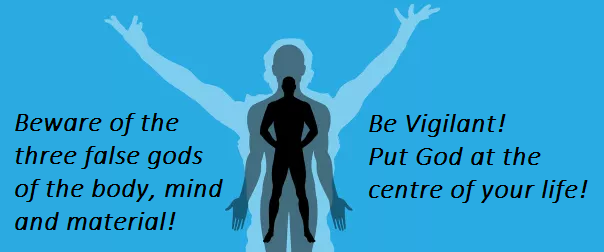 Archbishop Fulton Sheen explains that for many people we create “three false gods” of our lives. The first false god is “the false god of our own body.” When this happens, we will make sexual pleasure as the supreme goal of our lives and tries to achieve as much happiness though the pleasures, and strives to compensate our genuine desire for the eternal divine destiny with the intensity of erotic experiences.
Archbishop Fulton Sheen explains that for many people we create “three false gods” of our lives. The first false god is “the false god of our own body.” When this happens, we will make sexual pleasure as the supreme goal of our lives and tries to achieve as much happiness though the pleasures, and strives to compensate our genuine desire for the eternal divine destiny with the intensity of erotic experiences.
The second false god that many human beings try to create is the “false god of our minds” through the exaltation of our egos and our pride. We tell and convince ourselves, “There is no knowledge outside what I know; there is no law outside of my own will, and I must always be pleased.”
The third false god that many human beings try to create is “the false god of the material: of wealth, avarice and greed.” For such a person, they try to replace the infinite God with having more and more material possessions, and live a life of trying to impress the world with what they possess materially; thinking that they are worth something, because they have something.”
Archbishop Sheen concludes that, “the unhappiness of the human person comes from the adoration of three concupiscences: the lust of the flesh, the pride of life, and the abnormal love of the material world. The effects of such a reality of denying the existence of our infinite and all loving God is anxiety and despair.
When we remove God from the centre and foundation of our lives, we will inevitably experience a tremendous chasm of what we are experiencing in our lives, with what we ought to experience as a child of God who is created to be and become, the Christ-like person that God Wills of each of us.
Without God at the centre and foundation of our lives, and without living a life that vigilantly nurtures our true and authentic self, life would be empty, anxiety filled and miserable. We would be like a fish that is caught in a net; the more we struggle, the more we become entangled. We will suffocate in our little make believe world of our false gods. And, we will always be in great troubled, as we are breathing in the same air that we are breathing out. Or, we may feel like a mountain climber who cannot see the peak of the mountain in the fog, and at the same time be trembling as we may slip and fall into the abyss below.
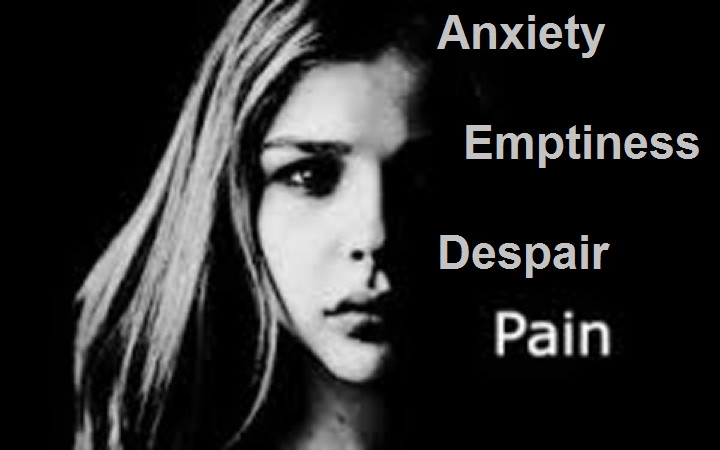 These anxieties and emptiness will persist, but strangely, like a person who is intoxicated, we remain obstinate and we keep a distance from the Gospel Truth of Christ that offers eternal happiness. We then very easily convince ourselves sub-consciously and soothe our consciences that it is acceptable to live such a secular and materialistic life, and imbibe the values of the masses who continue to take pride even in rejecting God, and ignoring the Truth that such a life can eventually destroy us, our loved ones and the gift of eternal life and happiness.
These anxieties and emptiness will persist, but strangely, like a person who is intoxicated, we remain obstinate and we keep a distance from the Gospel Truth of Christ that offers eternal happiness. We then very easily convince ourselves sub-consciously and soothe our consciences that it is acceptable to live such a secular and materialistic life, and imbibe the values of the masses who continue to take pride even in rejecting God, and ignoring the Truth that such a life can eventually destroy us, our loved ones and the gift of eternal life and happiness.
If we are not cautious and if we do not turn to living the vigilant life that Jesus in today’s Gospel urges of us, and if this pattern of life is not reversed soon enough, we constantly have anxiety and emptiness; leading to despair, dread and fear. And, torn between our natural deep longing for God, and living in the falsehood and hypocrisy of wanting to be god, and being disappointed in pleasure, our excesses would lead to revulsion. And, failing to find the infinite within, we make ourselves the object of dread.
Cardinal Luis Antonio Tagle, of Manila, of the Philippines, in his talk in Quebec, Canada speaks strongly against the false gods of our secular world today. He says, “The sad reality about false God is that other people are being sacrificed in order to preserve our self-interest. How many factory workers are being denied the right wages, for the God called Profit? How many women are being sacrificed, to the God called Domination? How many children are being sacrificed, to the God called Lust? How many trees, rivers, hills are being sacrificed, to the God called “Progress”? And how many poor people are being sacrificed, to the God of Greed? And defenceless people sacrificed, to the God of National Security?
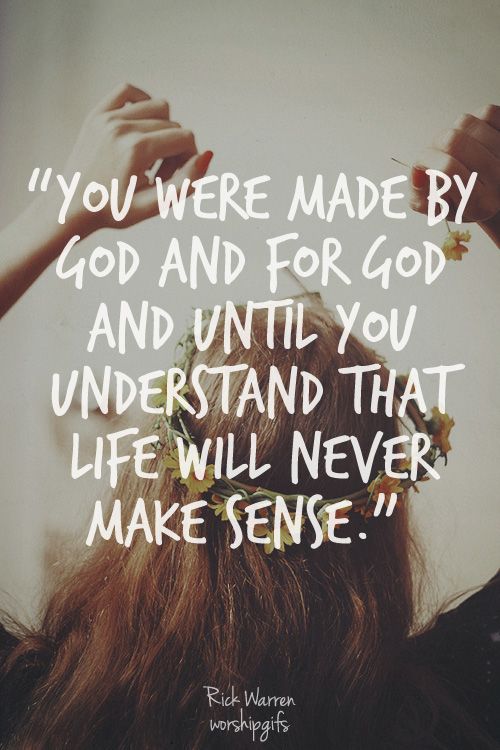 The Church too is not exempted from genuine self-examination. We must constantly examine our fidelity to the sacrifice to Christ, the sacrifice that is obedient to God, and compassionate to the poor. We cannot just point to others to examine themselves. We should examine ourselves. Like those who oppose Jesus in the name of authentic religion, we too could be blind to God and neighbours due to our self-righteousness, spiritual pride, and closeness or narrowness of mind.”
The Church too is not exempted from genuine self-examination. We must constantly examine our fidelity to the sacrifice to Christ, the sacrifice that is obedient to God, and compassionate to the poor. We cannot just point to others to examine themselves. We should examine ourselves. Like those who oppose Jesus in the name of authentic religion, we too could be blind to God and neighbours due to our self-righteousness, spiritual pride, and closeness or narrowness of mind.”
Amongst the ranks of the Church too, “ecclesiastically, this reality is cumbersome, when evilly and narrowly glorified, the church too might become hindrances to true worship and compassion.” Cardinal Tagle adds, “Let me make a Confession: I am disturbed when some people, who do not even know me personally conclude that my being a bishop automatically makes me closer to God than that they could ever be. My words are (taken as) God’s words. My desires are (taken as) God’s desire. My anger is (taken as) God’s angers. My actions are (also taken as) God’s actions. Oh my (goodness), what a power I have. And, if I am not cautious, I may just believe it and might even start demanding your offerings of the best food, the best wine, money, cars, houses, adulation and submission. After all (you treat me as though) I am God?! I might take so much delight in my stature and benefits that I might end up being insensitive to the need of the poor and the earth.”
My sisters and brothers in Christ, as I sum up and conclude let us be reminded that in all our illustrations, I believe it is clear that you and I are called by Jesus in today’s Gospel to live a life that does not take God for granted. We are called to value the gift of eternal life by putting God at the centre and foundation of our daily living, with vigilance. This is so that when we die, we will be ready to meet God and be judged as worthy to receive the gift of eternal happiness.
Unless, we live our faith consciously and humbly, and acknowledge that we as sinners who are in need God’s Mercy and strength, we can easily fall into the temptations of the devil in living our faith, as Archbishop Fulton Sheen explains, where we create first, “the false god of our body,” where we strive and seek after sexual pleasures as happiness. And, second we get absorbed by “the false god of our mind” where our ego and pride will take control of our lives, and make us totally self-centred.” And, thirdly, we create “the false god of the material” where we are blinded to think that wealth, avarice and greed can eventually replace the True God of happiness. With such lifestyles, we will choose to ignore how all these three false gods will eventually cause the crises of anxiety and despair in our lives; as many of us are already experiencing to be true.
In addition, to this truth, Cardinal Tagle also cautions that “the sad reality about false gods is that other people are being sacrificed in order to preserve our self-interest. And in this truth and reality, the Church too is not spared. And this means that we all need honest and humble reflection on the way we live and witness or counter-witness to the Gospel of Christ, to the secular world. I would like to end with two contrasting lifestyles that we seriously need to reflect on, and humbly ask ourselves which lifestyle describes me more accurately, and how is God challenging me to live my life more fully?
 The first poem is composed by an unknown author. In many ways it captures what Archbishop Fulton Sheen’s says as the three false gods of the body, mind and material, and what Cardinal Tagle condemns as “the false god to preserve our self-interest.” This poem is entitled, “How to be Miserable”; it says,
The first poem is composed by an unknown author. In many ways it captures what Archbishop Fulton Sheen’s says as the three false gods of the body, mind and material, and what Cardinal Tagle condemns as “the false god to preserve our self-interest.” This poem is entitled, “How to be Miserable”; it says,
Think about yourself.
Talk about yourself.
Use “I” as often as possible.
Mirror yourself continually in the opinion of others.
Listen greedily to what people say about you.
Expect to be appreciated.
Be suspicious.
Be jealous and envious.
Be sensitive to slights.
Never forgive a criticism.
Trust nobody, but yourself.
Insist on consideration and respect.
Demand agreement with your own views on everything.
Sulk if people are not grateful to you for favours shown them.
Never forget a service you have rendered.
Shirk your duties if you can.
Do as little as possible for others.
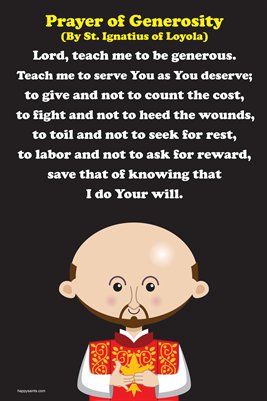 The second is a prayer. On the contrary, it captures what Jesus in the three illustrations of today’s Gospel proclaims. This prayer expresses the servant’s need to obey and serve the Master’s Will faithfully and with single-minded fidelity regardless of the costs and the crosses that come our way. This prayer that we all know so well, is popularly attributed to St Ignatius of Loyola. And, as from today when we pray the prayer, let us be more fully conscious of the challenges to live God’s Will with greater vigilance and fidelity, and allow its spiritual wisdom to seep into our hearts to transform us. This is the “Prayer of Generosity” that says,
The second is a prayer. On the contrary, it captures what Jesus in the three illustrations of today’s Gospel proclaims. This prayer expresses the servant’s need to obey and serve the Master’s Will faithfully and with single-minded fidelity regardless of the costs and the crosses that come our way. This prayer that we all know so well, is popularly attributed to St Ignatius of Loyola. And, as from today when we pray the prayer, let us be more fully conscious of the challenges to live God’s Will with greater vigilance and fidelity, and allow its spiritual wisdom to seep into our hearts to transform us. This is the “Prayer of Generosity” that says,
“Lord teach me to be generous,
Teach me to serve You as You deserve,
To give and not to count the costs,
To fight and not to heed the wounds,
To toil and not to seek for rest,
To labour and not to seek for reward,
Save that of knowing that I do Your most Holy Will”.
AMEN.
Adapted from: Life is Worth Living; pub.; Ignatius Press, San Francisco; USA; Fulton J.Sheen; 1954; pp.188-190.
Msgr Philip Heng, S.J.
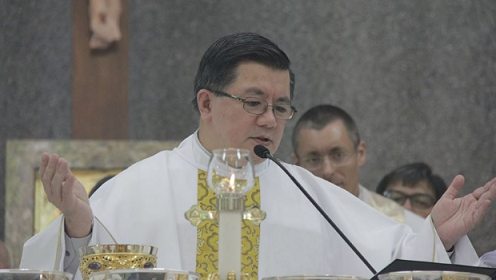
homepage zähler as at 12th August 2019
